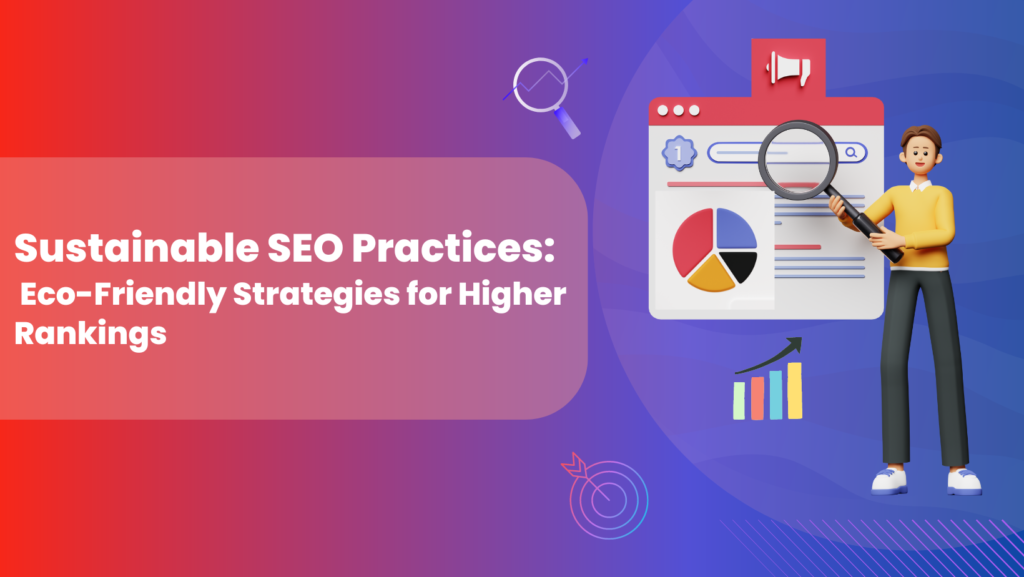
In today’s digital landscape, where the race for online visibility is fierce, it’s crucial for businesses to embrace sustainable SEO practices. Traditional SEO often involves resource-intensive activities like keyword stuffing, excessive content creation, and link building. However, these strategies can contribute to a higher carbon footprint due to increased energy consumption, data storage, and electronic waste. Recognizing the environmental consequences of these practices, there’s a growing need for a paradigm shift towards sustainable SEO.
The Impact of Traditional SEO on the Environment:
Traditional SEO practices often lead to a significant environmental impact. The energy-intensive nature of data centers, combined with the proliferation of digital content, results in substantial carbon emissions and electronic waste. Keyword stuffing and excessive content creation further exacerbate this issue, leading to unnecessary consumption of resources. As businesses increasingly prioritize sustainability, it’s essential to acknowledge the environmental consequences of traditional SEO. By transitioning to eco-conscious strategies, such as sustainable link building and content optimization, businesses can minimize their environmental footprint while still achieving higher rankings.
Embracing Eco-Friendly Keywords:
Embracing eco-friendly keywords is a key aspect of sustainable SEO. These keywords resonate with environmentally conscious audiences and reflect a brand’s commitment to sustainability. Tools like Google’s Keyword Planner can help identify relevant eco-friendly keywords by providing insights into search volume and competition. By integrating these keywords naturally into their content, businesses can not only enhance their SEO but also attract a target audience that shares their environmental values. Ultimately, incorporating eco-friendly keywords into their SEO strategy can lead to higher rankings while aligning with sustainable practices.
Optimize for Speed and Efficiency:
Optimizing website speed is crucial for both user experience and environmental sustainability. Slow-loading websites consume more energy, contributing to higher carbon emissions. Techniques such as image compression, code minification, and browser caching can significantly improve website performance while reducing energy consumption. By optimizing for speed and efficiency, businesses can not only enhance their SEO but also minimize their environmental impact. Additionally, prioritizing website speed can lead to a better user experience, resulting in higher engagement and conversions.
High-Quality Content and Long-Term Value:
Creating high-quality, evergreen content is fundamental to sustainable SEO. Unlike shallow, short-lived content, evergreen content provides enduring value to users and reduces the need for frequent updates. Thorough research, well-structured articles, and multimedia elements are essential for creating such content. By focusing on quality over quantity, businesses can satisfy user intent, reduce bounce rates, and enhance their credibility in the eyes of search engines. Ultimately, investing in high-quality, evergreen content is a sustainable approach that can drive long-term success in SEO.
Reduce, Reuse, Recycle – Content Optimization:
Content optimization is a sustainable practice that involves repurposing and updating existing content to reduce resource consumption. Rather than creating entirely new content, businesses can refresh old blog posts with updated information, statistics, and insights. Transforming written content into other formats, such as videos or infographics, can also extend its lifespan and reach new audiences. By adopting a “reduce, reuse, recycle” approach to content creation, businesses can minimize their environmental footprint while still maintaining a strong online presence.
Local SEO and Sustainability:
Local SEO offers businesses an opportunity to connect with nearby customers while also supporting sustainability efforts. By claiming and optimizing their Google My Business listing, businesses can improve their local visibility and attract customers in their area. Encouraging customer reviews and participating in local community events further strengthens their local presence. By engaging with their community and emphasizing local partnerships, businesses can not only enhance their local SEO but also contribute to a greener world.
Ethical Link Building and Partnerships:
Ethical link building is a sustainable SEO strategy that involves building meaningful partnerships with eco-conscious organizations, influencers, and bloggers. By collaborating with partners who share their sustainability values, businesses can acquire sustainable backlinks and increase their visibility online. Creating valuable, engaging content that benefits all parties involved is essential for fostering genuine relationships. Ultimately, ethical link building is not only beneficial for SEO but also for promoting ethical and eco-friendly practices in the digital space.
Mobile Optimization and Green Practices:
Mobile optimization is crucial for both SEO and environmental sustainability. Mobile-friendly websites consume less energy and offer better user experiences compared to desktop devices. Implementing responsive design ensures that websites adapt seamlessly to various screen sizes, while Accelerated Mobile Pages (AMP) further enhance mobile loading times. Additionally, optimizing for voice search takes advantage of mobile usage trends and reduces energy consumption. By prioritizing mobile optimization and adopting green practices, businesses can contribute to a greener digital ecosystem while improving their SEO performance.
Conclusion:
Sustainable SEO practices offer a dual benefit: higher rankings and reduced environmental impact. By acknowledging the environmental consequences of traditional SEO practices, businesses can transition to eco-friendly strategies that align with their sustainability goals. Embracing eco-friendly keywords, optimizing for speed and efficiency, creating high-quality content, and engaging in local partnerships are just some of the ways businesses can adopt sustainable SEO practices. Ethical link building and mobile optimization further contribute to a greener digital landscape. As businesses increasingly recognize the importance of social and environmental responsibility, integrating sustainable SEO practices becomes essential for long-term success in the digital space.
To Learn more about digital marketing concepts, latest trends and digital strategies join our comprehensive Pro Digital Marketing Course Now.

Howdy! Do you know if they make any plugins to help
with Search Engine Optimization? I’m trying to get my website to rank for some targeted keywords but
I’m not seeing very good gains. If you know of any please share.
Thanks! You can read similar text here: Escape room lista